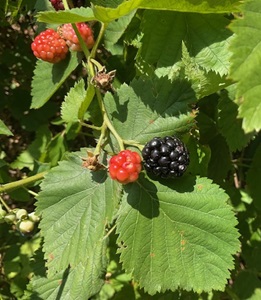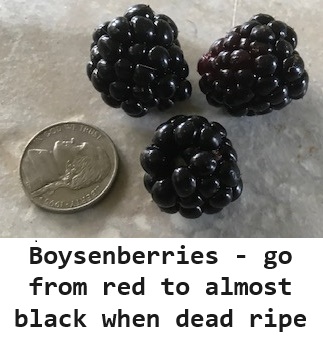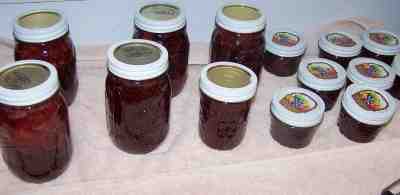
Olallieberry U-Pick Orchards in Colusa, Lake, Napa, Sacramento, Solano, Sutter, Yolo and Yuba counties in California in 2025, by county
Below are the U-Pick orchards and farms for olallieberries that we know of in this area.
Not all areas of a state have olallieberries orchards that are open to the public. If you know of any others, please tell us using the add a farm form!
Remember to always check with the farm's own website or Facebook page before you go - or call or email them if they don't have a website or Facebook page. Conditions at the farms and crops can change literally overnight, so if you want to avoid a wasted trip out there - check with the farm directly before you go! If I cannot reach them, I DON'T GO!
PLEASE report closed farms, broken links and incorrect info using the "Report Corrections" form below.
New! As inflation remains high, see this page for
reliable (tested) brands of generic canning lids at lower
costs, and cost-saving measures for
getting fruit and vegetables and home canning.
If you are having a hard time
finding canning lids, I've used these, and they're a great price & ship in 2 days.
New! Road tripping and camping is a great way to have a fun, safe and inexpensive family trip. The national and state parks and monuments are open, and campgrounds usually cost between $10 and $40 per night. September to November is the best camping weather. See our new website Road Tripping and Camping.com for tips, tricks, guides, checklists and info about parks, monuments and other places to visit.
New! We just went live with our latest website, FunFactoryTours.com - As they name implies, you can find a fun factory tour, including chocolate, automobiles, historical forts and sites, famous buildings, Active Federal facilities even fun geology: like fossils and volcanic areas
Yolo County (Sacramento area)
- Pacific Star Gardens - Certified Organic, apricots, blackberries, flowers, marionberries, olallieberries, strawberries, and prepicked produce, school tours
20872 County Road 99, Woodland, CA 95695. Phone: 530-666-7308. Email: pacificstargardens@yahoo.com. Open: Monday-Sunday, 9 am to 7 pm. Directions: Interstate 80 east to Highway 113 north, Road 27 exit, turn left go one mile to Road 99, turn right, we are about a mile north. Click here for a map and directions. Payment: Cash, only. Crops are usually available in April, May, June, July. We are certified organic for all crops! [ ] (UPDATED: May 1, 2025, JBS)
[ Click here to update the listing ]
Boysenberry
Boysenberry Picking Tips, Recipes and Information
 Boysenberries
originated in Anaheim, California, in the 1920s when horticulturist Rudolph Boysen, a Swedish immigrant with a ranch there in the Napa Valley, developed the
boysenberry by crossing a dewberry–loganberry hybrid with raspberries and blackberries. The plant is hardy, vigorous and thornless. The history is still a bit
muddled, but this is the most accepted genealogy. Boysen later gave the boysenberry to Walter Knott of Knott's Berry Farm who popularized it.
Boysenberries
originated in Anaheim, California, in the 1920s when horticulturist Rudolph Boysen, a Swedish immigrant with a ranch there in the Napa Valley, developed the
boysenberry by crossing a dewberry–loganberry hybrid with raspberries and blackberries. The plant is hardy, vigorous and thornless. The history is still a bit
muddled, but this is the most accepted genealogy. Boysen later gave the boysenberry to Walter Knott of Knott's Berry Farm who popularized it.
Boysenberries look like small blackberries, about 1/2 inch to 1 inch across, but have a sweeter, flavor with fewer smaller seeds and hints of raspberry flavor. Boysenberries prefer a mild, damp climate, but still survive in hot climates, although it they do not get enough water, the berries will be more dense, like a raison, rather than plump and juicy. This is probably the easiest berry to grow, bar none.
They typically peak during June in the South of the U.S., and in July in the north and in Canada. Crops are ready at various times of the month depending on which part of the state you are located. In order to produce good local Boysenberries, producers depend on ideal spring and early summer weather conditions. See this page for a list of boysenberry festivals around the U.S.
Before you leave to go to the farm:/b>
- Always call before you go to the farm - And when they are in season, a large turnout can pick a field clean before noon, so CALL first!
-
Leave early. On weekends, then fields may be picked clean by NOON!
-
Most growers furnish picking containers designed for Boysenberries, but they may charge you for them; be sure to call before you go to see if you need to
bring containers.
IIf you use your own containers, remember that heaping Boysenberries more than 5 inches deep will bruise the lower berries. Plastic dishpans, metal oven pans with 3 inch tall sides and large pots make good containers. I like the Glad storage containers like the one at right. - Bring something to drink and a few snacks; you'd be surprised how you can work up a thirst and appetite! And don't forget hats and sunscreen for the sun. Bugs usually aren't a problem, but some deet might be good to bring along if it has been rainy.
Tips on How to Pick Boysenberries
- There are two types of boysenberries to know about: thorny and thornless! Obviously, the thornless are easier to pick, but some people claim the thorny varieties are sweeter. With the thorny plants, you want to reach into the plant in the gaps, so you don't need to touch anything but the berry you're after, avoiding the thorns.
- A ripe boysenberry is deep black with a plump, full feel. It will pull free from the plant with only a slight tug. If the berry is red or purple, it's not ripe yet.li>Repeat these operations using both hands until each holds 3 or 4 berries. Unlike strawberries, boysenberries are usually pretty tough, I dump mine into the bucket. Repeat the picking process with both hands.
- Don't overfill your containers or try to pack the berries down.
General Picking Tips
Whether you pick Boysenberries from your garden or at a Pick-Your-Own farm, here are a few tips to keep in mind:
- Pick only the berries that are fully black. Reach in between the stems to grab for hidden berries ready for harvest. Bend down and look up into the plant and you will find loads of berries that other people missed!
- Avoid placing the picked berries in the sunlight any longer than necessary. It is better to put them in the shade of a tree or shed than in the car trunk or on the car seat. Cool them as soon as possible after picking. Boysenberries may be kept fresh in the refrigerator for up to a week, depending upon the initial quality of the berry. After a few days in storage, however, the fruit loses its bright color and fresh flavor and tends to shrivel.
WWhen you get home
- DON'T wash the berries until you are ready to use them or freeze them. Washing makes them more prone to spoiling.
- Pour them out into shallow pans and remove any mushed, soft or rotting berries
- Put a couple of days supply into the fridge, wash off the others, drain them and freeze them up! (Unless you're going to make jam right away)
Boysenberries are less perishable than blueberries or strawberries, but refrigerate them as soon as possible after picking. Temperatures between 34 F and 38
F are best, but, be careful not to freeze the boysenberries (while they are in the fridge)!

- Even under ideal conditions boysenberries will only keep for a week in a refrigerator, so for best flavor and texture, use them as soon as possible after purchase
Boysenberry Recipes, Freezing and Jam directions
Blackberry recipes work exactly the same with Boysenberries
- How to make Boysenberry jam/a> - It is VERY easy - especially with our free Boysenberry jam directions - very easy!
- How to make Boysenberry jelly
- How to freeze berries
- Boysenberry syrup, make and can it!
- Seedless boysenberry pie!
- Boysenberry Festivals: Where, When and More to Find an Boysenberry Festival Near You this year:
Boysenberry Facts and Tips
-
 Black Raspberries, also
known as "black caps" are a very healthy food; packed with anthocyanins!
Black Raspberries, also
known as "black caps" are a very healthy food; packed with anthocyanins! - The USDA says 1 cup of boysenberries has about 62 calories.
- 1 cup of boysenberries, not packed down weighs about 140 grams.
- Select plump, firm, fully boysenberries. Unripe berries will not ripen once picked.
- Ohio State University's Article Regarding Their Prevention of Cancer
- OOregon Berry Black Raspberry Brochure
- Guide to blackberry varieties
- Researchers have known for quite some time that all blackberries varieties contain antioxidants which help to fight cancer causing free radicals. A study at the University of Ohio has found that boysenberries are the most potent cancer fighting berries of them all, by nearly 40 percent!
- U-pick Boysenberry farms typically sell berries by the pound. A quart equals 1 and 1/2 pounds of fresh berries.
- You can easily freeze berries that you cannot use right away - just wash, cut the hulls off and pop them into a ziplock bag, removing as much air as possible. Those vacuum food sealers REALLY do a good job of this! The berries will keep for many months frozen without air.
Other Local Farm Products (Honey, Horses, Milk, Meat, Eggs, Etc.)
(NOT pick-your-own, unless they are also listed above)
- Farm markets and roadside stands
- Local Honey Finder
- Local Meat, Milk and Eggs
- Venues: Farms, Wineries, Orchards for your event, wedding or party
- Easter egg hunts
- Children"s consignment sales
- Fruit and vegetable festivals
- Winery tours and wine tastings
- Horse rides, stables, lessons, trails
- Maple Syrup farms and sugarworks
- Bed & Breakfasts on Farms, Wineries, Ranches and Orchards
- Pumpkin patches
- Corn mazes
- Zombie Paintball venues
- Christmas Tree Farms & lots
- Environmental resources
- Consumer fraud information
- Wholesale food sources
- Resources for Farmers
Looking for canning equipment and supplies?
Water bath canner with a jar rack
Pressure canners for gas, electric and induction stoves: Presto 23Qt or T-fal 22Qt
Canning scoop (this one is PERFECT)
Ball Blue book (most recent version)
Jars: 8oz canning jars for jams
Find Other types of farms:
Farm markets and roadside stands
Road trips and camping resources
Local Honey, apiaries, beekeepers
Consumer fraud and scams information
Home canning supplies at the best prices on the internet!
Maple Syrup Farms, sugarworks, maple syrup festivals
Environmental information and resources
Farms For Your Event for birthday parties, weddings, receptions, business meetings, retreats, etc.
Festivals - local fruit and vegetable festivals
Get the
most recent version of
the Ball Blue Book
With this Presto 23 quart pressure canner and pressure cooker, you can "can" everything, fruits, vegetables, jams, jellies, salsa, applesauce, pickles, even meats, soups, stews. Model 01781

You can make jams, jellies, can fruit, applesauce, salsa and pickles with water bath canners, like this Granite Ware 12-Piece Canner Kit, Jar Rack, Blancher, Colander and 5 piece Canning Tool Set

